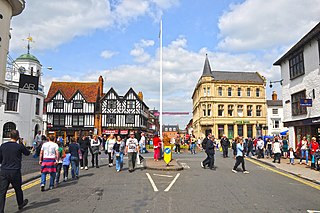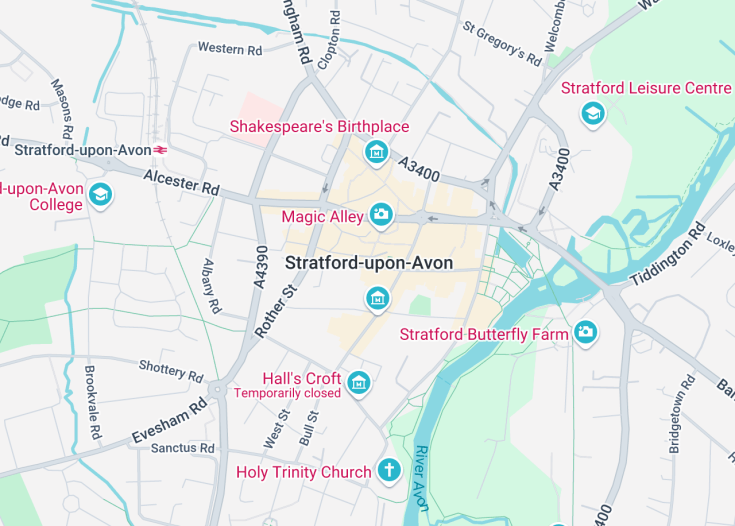Stratford-upon-Avon, a medieval market town in England’s West Midlands, is best known as the birthplace of William Shakespeare. Visitors from around the world come to explore its rich history, beautifully preserved Tudor architecture, and vibrant cultural scene.
This enchanting locale offers an array of historical sites, theaters, and scenic walks along the River Avon, making it an essential destination for literature lovers and history enthusiasts alike.
For an authentic Shakespearean experience, attend a performance at the renowned Royal Shakespeare Theatre. Ensure to book in advance as shows often sell out quickly.
Consider a guided tour of Shakespeare’s birthplace and other historic sites for a deeper understanding of Stratford-upon-Avon’s unique heritage and charm.
Top things to do & see in Stratford-upon-Avon
Select the following sights and activities to discover best tickets and tours available in Stratford-upon-Avon.
Stratford-upon-Avon: The Bard’s Birthplace
| Country | England (United Kingdom) |
| Time in Stratford-upon-Avon | GMT+0 |
| Language spoken | English |
| Population | 31,485 (source: latest census data) |
| Currency | British Pound (£, GBP) |
| Airports |
|
Stratford-upon-Avon, nestled in the heart of England, is best known worldwide as the birthplace of William Shakespeare, the renowned English playwright and poet. This charming medieval market town not only boasts a rich history over 800 years old, but it also maintains a vibrant cultural scene to this day, drawing tourists and Shakespeare enthusiasts from around the globe.
The town’s architecture is a splendid showcase of centuries-old buildings that seem to hold the echoes of the past, from the well-preserved Tudor-style houses to the majestic Holy Trinity Church where Shakespeare was laid to rest. Visitors can explore a variety of historic sites including Shakespeare’s Birthplace, Anne Hathaway’s Cottage, and the Royal Shakespeare Theatre, an operational hub of performances dedicated to Shakespeare’s works.
Culturally, Stratford-upon-Avon is a bustling hub with numerous festivals celebrating both Shakespeare and various arts throughout the year. The town’s picturesque streets, lined with quaint shops and traditional pubs, offer a cozy yet lively atmosphere. Art galleries, parks, and gardens provide peaceful havens for relaxation and enjoyment of the beauty that this historic town has to offer.
Education and learning play a central role in local life, with several institutions dedicated to the study of Shakespeare, including The Shakespeare Institute. The town’s commitment to preserving and promoting its history is evident in its well-maintained museums and educational sites dedicated to the playwright’s legacy.
Given its profound historical importance and cultural richness, Stratford-upon-Avon remains a key destination for those seeking connection with English literature’s most iconic figure, providing a deeply immersive historical experience interwoven with the arts, making it a unique and fascinating place to visit or live.
Where is Stratford-upon-Avon?
Stratford-upon-Avon is situated in Warwickshire, England, lying close to the River Avon.The town enjoys a central location within the United Kingdom, making it easily accessible from major cities.
Distances:
| Route | Distance by car | Time by car |
|---|---|---|
| From London | 102 miles | Approx. 2 hours 20 mins |
| From Birmingham | 40 miles | Approx. 1 hour |
What is Stratford-upon-Avon famous for?
Stratford-upon-Avon is world-renowned as the birthplace of William Shakespeare. This historic town attracts visitors with its rich Shakespearean heritage and numerous related sites, including theaters, museums, and yearly festivals dedicated to the playwright.
History
Prehistoric Period to Middle Ages
Stratford-upon-Avon’s history stretches back to prehistoric times, where evidence suggests early settlement along the banks of the River Avon. By the Saxon period, a small village had formed, known for its strategic positioning at a fordable point on the river. The town’s official foundation occurred in the 12th century, attributed to John of Coutances who constructed a bridge and laid the groundwork for the community’s development. By the Middle Ages, Stratford had gained a monastic order and several market charters, showcasing its burgeoning importance as a regional market town.
16th to 17th Century
Stratford-upon-Avon’s prominence surged with the birth of William Shakespeare in 1564. The town’s association with Shakespeare spurred its evolution into a cultural hub. The 16th and 17th centuries marked significant advancements in building and trade, reflecting the wealth accumulated through local industries such as agriculture and the emerging arts scene, largely influenced by the Bard himself. This period saw the construction of many of the timber-framed properties that are today revered as quintessential Stratford architecture.
18th Century to Victorian Era
The 18th century heralded the dawn of tourism in Stratford-upon-Avon, spurred by the legacy of Shakespeare. Admirers of his works began to visit, eager to see the places he had lived and breathed. Victorian Stratford saw considerable investment in commemorating Shakespeare, including the restoration of his birthplace and the construction of the Royal Shakespeare Theatre in 1879. This era firmly established Stratford-upon-Avon as a key destination for international literary pilgrimage.
20th Century to Present
The 20th century marked a period of consolidation and expansion for Stratford-upon-Avon’s tourist infrastructure. The town enhanced its offerings with the establishment of additional cultural venues and museums tied to Shakespearean history. Today, Stratford is not just a beacon for Shakespeare enthusiasts but also a vibrant community with a rich programme of events and festivals celebrating both its historical heritage and contemporary culture. Modern developments have respected the town’s historic character while ensuring it remains relevant and lively in the present day.
Visit Stratford-upon-Avon
What to see and do in Stratford-upon-Avon, England (United Kingdom).
Explore the rich tapestry of history and culture in Stratford-upon-Avon, starting with the birthplace of William Shakespeare. Delve into his life and works at the Shakespeare’s Birthplace Trust properties, which include Anne Hathaway’s Cottage, Mary Arden’s Farm, and Shakespeare’s New Place.
The Royal Shakespeare Company offers world-class performances of classical and contemporary works. For a scenic view, stroll along the banks of the River Avon or enjoy a boat ride. The town also boasts charming streets lined with unique shops and traditional tea rooms.
- Shakespeare’s Birthplace
- Royal Shakespeare Theatre
- River Avon
- Holy Trinity Church
Festivals in Stratford-upon-Avon
Stratford-upon-Avon hosts a variety of cultural events year-round, with particular highlights being the Stratford-upon-Avon Literary Festival in spring and the Stratford-upon-Avon Music Festival in autumn. The town also celebrates Shakespeare’s birthday each April with parades and performance events.
Best time to visit Stratford-upon-Avon
The best times to visit Stratford-upon-Avon are during the late spring and early autumn. These seasons offer pleasant weather and coincide with key cultural events, making them ideal for experiencing the town’s vibrant atmosphere and historic sites.
Is Stratford-upon-Avon worth visiting?
Stratford-upon-Avon is unequivocally worth visiting. It is not only the birthplace of William Shakespeare, the greatest playwright in the English language, but also a town rich in history and cultural depth.
Visitors can experience world-class theater performances, explore historical sites related to Shakespeare’s life, and enjoy the natural beauty of the Warwickshire countryside. Its blend of literary heritage and picturesque surroundings makes it a unique and captivating destination.










